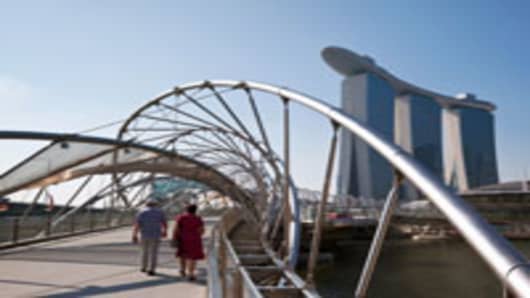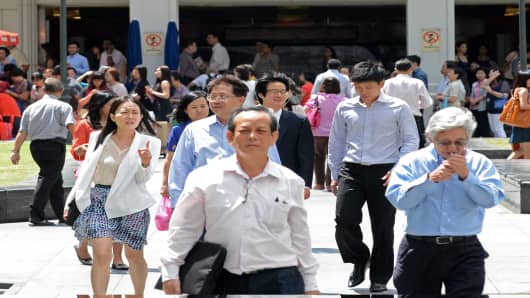Singapore, one of Asia's largest financial centers, has seen a big inflow of expatriates in recent years. Now, as a sharp rise in the cost of living threatens high living standards, the city-state may well be at risk of becoming a victim of its own success.
Foreigners make up about 38 percent of Singapore's population, up from about 25 percent in 2000. More than 7,000 multinational companies operate in the city and expat workers are seen as key to developing Singapore, not just as a regional hub in finance but also in other sectors such as oil and gas.
Weak exports and a slowdown in the manufacturing sector hurt Singapore's economy last year, with the economy just avoiding a recession in the final three months of 2012.
While low taxes, good air quality and less crime lure workers to Singapore from across the world, the recent push up in housing, schooling and transport costs could discourage expats from moving or staying in the city long-term, analysts said.
Darika Suter, who has lived in Singapore for 24 years, is re-locating her antiques business to the Thai island Phuket in March. She says that while higher costs are not the only reason for the move they certainly make it no "fun" to do business in Singapore any longer.
"I can use the funds I have built up to live comfortably in Thailand, so why stay in Singapore and sweat it out?," she says. "Basically, I can keep up the lifestyle I have here, where I spend about S$2,000 a month (US$1,613), and have the same in Phuket for S$800 a month."
Rising costs and a growing population, which the government expects could increase to almost 7 million by 2030 from the current 5.3 million, has also led to discontent among locals who feel the influx of foreign workers has led to overcrowding on trains and buses and contributed to the overall rise in living costs.
For economists the implications of rising costs in Singapore could not be clearer: wage pressures could build up, they warn. "From a cost point of view, Singapore has leaped frog ahead in terms of being one of the world's most expensive cities," said Vishnu Varathan, an economist at Mizuho Corporate Bank. "This is something to watch, because it would translate into pipeline wage pressures."
Singapore has slowly moved up human resources firm Mercer's rankings of most expensive cities, moving to sixth place in 2012 from eighth in 2011 and eleventh in 2010.
"When I moved here in 2004, I used to think that everything was cheap especially because the (British) pound was stronger against the Singapore dollar," said Paul Dodson, who works for an international bank and lives in Singapore with his wife and two children.
"I used to pay S$2 for a short hop in a taxi, which was less than one pound then. Now it's more than $$2 before you even start using the taxi. It's not just that prices have gone up, but because sterling has weakened, it feels like there is a double-whammy effect," he said.
(Read More: Slide show on the World's Most Expensive Places to Live 2012)
The Singapore dollar has appreciated almost 15 percent over the past 5 years.
High property prices, pushed up by increased demand from a growing population, have been one of the major contributors to the cost of living. For instance, Singapore property prices surged 50 percent between 2007 and 2011, driven partly by foreign buying.
Analysts said it's a problem the government is only too aware of, as seen by its latest stringent property measures aimed at keeping a lid on home prices. The steps, which include restrictions on properties bought by foreigners, could however discourage expats from staying long-term.
(Read More: Seventh Time Lucky for Singapore Property Measures?)
"I think the housing policies could put people off from staying here...they can't get on the property ladder and renting is expensive," said Dodson.
Singapore ranks eighth in the world's most expensive cities for rent, a survey by consulting firm ECA International showed this week, with Hong Kong taking the top spot.
(Read More: World's Most Expensive City to Rent Is…)
While inflation for much of the past five years has stayed around four percent, real inflation is higher with costs for food, transport, eating out all rising. Singapore is also one of the most expensive places in the world to buy a car, with permits to buy new vehicles called a certificate of entitlement (COE) adding to the cost of buying a car in Singapore.
A Honda City for example costs about US$120,887 in Singapore and about US$29,000 in neighboring Malaysia.
A New Trend?
Diana Low, a director at the recruitment firm Michael Page, says rising living costs have become a big factor in job negotiations compared with 5 years ago and even more so as a growing number of international firms shift to local packages from expat ones.




